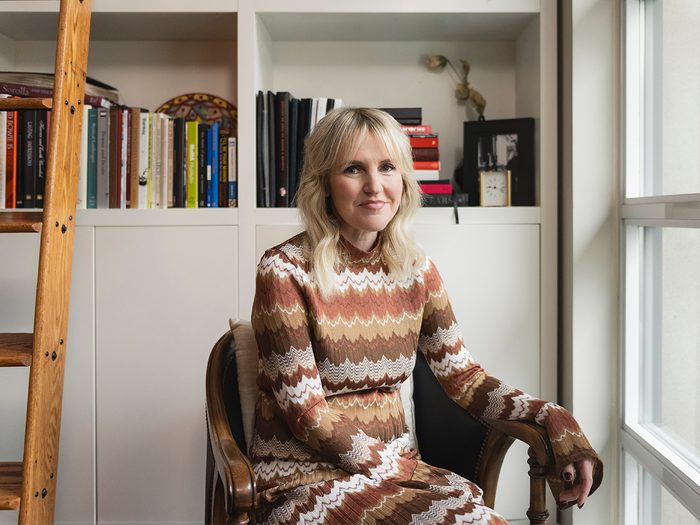I Thought I Had a Hangover—A Month Later, I Was Diagnosed With MS

Here’s how one woman was diagnosed in her early twenties, and what she wants others to know about the central nervous system disease.
Canada has one of the highest rates of multiple sclerosis, which is a neurodegenerative disease, but researchers have yet to determine why. Rates are higher in northern latitudes, and women are more than twice as likely as men to develop it. The cause of MS is unknown, but scientists believe it has to do with people who have a certain combination of genes being exposed to certain environmental triggers.
I would say my multiple sclerosis diagnosis wasn’t really remarkable because, I’m hardly the only one diagnosed at a young age—the majority of people are diagnosed between the ages of 20 and 40. But it’s certainly traumatizing when your life is upended at just 23. Some people have years of tingling or sensory symptoms, but for me, my symptoms came out of the blue.
I felt like I had a hangover living in my eye. It had felt that way since the day before, and I was in the car with my friends in Hamilton, where I lived, driving to Buffalo, to go shopping. It got so bad that I asked them to stop at Shoppers Drug Mart so I could take a handful of Tylenol. I couldn’t function. Any time I moved my eyes left or right, I felt this unbelievable stabbing pain.
A couple days later, I went to a walk-in clinic. The doctor told me I was stressed and needed to take time off work. A few days after that, my vision got blurry. I could barely see out of my left eye. I still thought I just needed antibiotics or something. I walked to the emergency room and a doctor did a battery of tests and told me to come back the next day. When I did, I was told I had optic neuritis, I needed an MRI and there’s a 50 percent chance I have MS.
Of course, I couldn’t believe it. I fell apart. I lost my mind. I was sobbing, hysterical, inconsolable. A month felt incredibly long. This time ended up being one of the most stressful periods of my life.
Two weeks later, I got a migraine and starting losing my vision, hearing and balance. I developed numbness in my feet and on my face, and started having trouble getting up the stairs. I spent a lot of time at my parents’ house, letting them cook for me and care for me. Friends and family kept saying, there’s no way you have MS, but I knew what was going on in my body, so it wasn’t comforting for people to tell me that. By the time that month had ended, I knew I had MS.
One of the burdens of this disease is having to reassure other people that you’re okay. Even the doctor diagnosing you. People don’t know what to say. When I was diagnosed, there was a lot of championing. You know, God doesn’t give us more than what we can handle, and You can fight this, and looking back now, I feel that was really toxic. What would’ve been helpful is, We hope you get your best-case scenario, but if things don’t go as expected, here are the tools, support and resources that will help you adapt and learn to live with this. Messaging is very strong when you’re first diagnosed. It doesn’t help to hear that not everyone ends up in a wheelchair. That doesn’t prepare us to handle it if that’s the case. It just means cross your fingers and hope for the best. What we need to hear is, These are the ways to go on and you will adapt, and here’s how other people have adapted.
I had a considerable recovery after that first attack. I’d taken time off work, was resting and changed my diet to pay attention to the things I could control. I started medication to help in my recovery. Six months later, my vision had improved, but it wasn’t back to baseline. My walking improved, and my balance. It’s an amazing feeling to struggle to walk and then have recovery and to be able to again. But it took high-dose steroids plus months of rest and recovery for my walking to get back to baseline after my first spinal cord attack. I don’t know why I wasn’t offered physiotherapy at the time. It’s something I still have to fight for today.

In the early stages, most people are diagnosed with a kind of MS called relapsing-remitting, characterized by periods of super dramatic attacks followed by periods we’ll call remission, but it’s definitely a misnomer because you never get quite back to baseline. As the years and MS attacks go on, you recover but never back to the way you were. It’s like the damage accumulates with every attack—that’s why time is of the essence when it comes to an MS diagnosis. The sooner you can get on a therapy, the better.
Although the doctor at the walk-in clinic delayed my diagnosis, I can’t fault him. I feel very lucky to have found the doctor, nurse and neurologist in the emergency room who recognized what I had right away. I got a diagnosis faster than most people. We need to do better about that globally. Some people have to wait months for approval from insurance companies to get on therapies. You’re gambling with that whole time period. Anything can happen. I had a devastating relapse between medications at one point and I lost function that I’ll never get back. That didn’t have to happen. That’s a particularly hard pain point, when you’re working within a healthcare system.
It’s been a while since my diagnosis. I’m not going to share my age because I feel like people with MS will make comparisons, like how many years it took me to go from walking to using a rollator. MS is different for everyone, so I don’t want to be used as a gauge. I’m now a blogger and podcaster, creating the content that I wish had been available to me when I was first diagnosed. I share things I’ve learned over the years, but even as a veteran, I’m still learning stuff all the time—my body’s still changing all the time.
Canada has the highest rate of MS in the world. And there’s so much stigma around chronic illness and disability that a lot of people are not very open about it. I spoke at an event hosted by EMD Serono for the #soTHISisMS movement, which aims to retell the narrative around Multiple Sclerosis in Canada. I got to tell people This is what MS is really like, and that included sharing some of the hidden difficulties and stresses of an invisible illness, in particular the symptoms that we can’t see, like numbness, pain and fatigue. I also talked about the stress and anxiety that comes with MS, and what happens to relationships, your job, your sense of self—the MS symptoms on top of the physical ones. The #soTHISisMS campaign allows us to bring more awareness to the disease, but also to help destigmatize chronic illness and others find a community.
Next: 11 Things Millennials Should Know About Autoimmune Diseases




